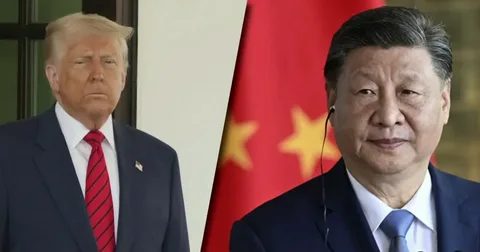High-stakes economic talks between China and the United States of America reached high stakes over the weekend in Geneva as the two global superpowers struggled to cool the heat emanating from a mounting tariff war. The urgent talks followed the US President Donald Trump’s move to slap a gigantic 145% tariff on Chinese imports, prompting China to return with a 125% tariff on US imports.
The outcome? A virtual standstill in trade between the world’s two biggest economies and growing fears of an impending global recession. As both countries harden, the fate of the global economy, supply chains, and market stability is at stake. Experts say these high-stakes economic talks could set the course for global trade in the next few years.
Read More: US-UK Trade Agreement Sparks New Era in Global Economics
Tariff War Rattles Global Markets and Businesses
The trade war, which is continuous, has shocked global markets. The historic 145% American tariff, answered by China’s high 125% retaliation, has led companies to reconsider manufacturing, shipping, and pricing strategy. For Chinese-dependent American firms, the blow has been swift—increasing costs, trimmed profit margins, and planning in doubt. Among Chinese firms, exporters face pressures as worldwide demand falters.
Economists put the contraction of the U.S. economy in Q1 of 2025 at 0.3%, and China’s own estimated year-on-year growth for 2025 has now been reduced to 4%, below the government’s target of 5%. As supply chains disintegrate and inflation bites, consumers around the world are beginning to feel the squeeze. Global investors, fearing erratically changing policy, are following high-stakes economic talks in Geneva with hopeful scepticism. Most expect these high-stakes economic talks to translate into concrete policy changes that will turn the present slump around.
Behind Closed Doors: Diplomatic Tensions and Disputes
Although the high-stakes economic negotiations are diplomatic, they are not smooth. China’s choice to send Vice Premier He Lifeng was interpreted as a strategic gesture of willingness to cooperate but also as a defensive gesture against economic isolation. Washington’s overtures contributed to China’s return to the table, particularly as President Trump moderated his rhetoric—temporarily.
But tensions erupted even before the negotiations started. Procedural disputes and what Chinese officials called a “disrespectful” U.S. letter on fentanyl almost scuttled the meeting. Trump’s mercurial style, such as a recent call for an 80% tariff just days before the high-stakes economic talks, has only increased suspicion. In spite of these difficulties, both countries realize they cannot afford a long economic standoff and are forced to seek progress through these high-stakes economic talks.
Also Read: Fast-Track Status for Gulf Wealth Funds to Transform US Ties
Global Supply Chains and Economic Stability on the Line
What’s really at risk in Geneva isn’t the bilateral trade relationship—it’s the well-being of the global economy. With top manufacturers and retailers in the crosshairs, supply chains are being redirected, production schedules delayed, and inventories thrown into disarray.
From electronics and autos to agriculture and pharma, industries across the globe are preparing for long-term fallout if no breakthrough is achieved. Other countries outside the U.S. and China are also starting to feel the ripple effects, as slowed trade and rising uncertainty risk stunting global growth. Even a partial reduction in tariffs through these high-stakes economic talks could bring welcome relief and mark a turning point. The high-stakes economic negotiations also highlight the susceptibility of the global economy to superpower tensions.
Indications of Optimism—but Risks Still Loom Large
In spite of the bumpy beginning, the mere fact of reviving high-level economic negotiations has injected some hope into an anxious international climate. Even a modest step forward—such as a temporary withdrawal of tariffs or agreement to remain at the negotiating table—could stabilize markets and give additional time for deeper talks, analysts say.
Businesses and investors are still on guard, however. Until tangible results are realized, the reality of higher costs, interrupted operations, and strategic ambiguity will remain. As Geneva takes center stage in the global economic dialogue, the world is left waiting—and hoping—that diplomacy wins out over confrontation. These high-stakes economic talks may not produce grand bargains overnight, but their importance cannot be overestimated. A productive round of high-level economic talks would restore confidence and set the tone for future cooperation.
For More Trending Business News, Follow Us 10xtimes News






